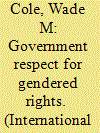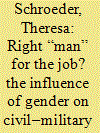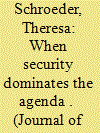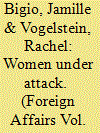| Srl | Item |
| 1 |
ID:
120868


|
|
|
|
|
| Publication |
2013.
|
| Summary/Abstract |
Using two-stage least-squares regression models, I analyze the effect of the Convention on the Elimination of All Forms of Discrimination against Women (CEDAW) on rated levels of respect for women's rights. The results show that CEDAW has a strong positive effect on women's political rights, no effect on economic rights, and a partially negative effect on social rights. Detailed analyses of political outcomes reveal that CEDAW membership was associated with an increase in the share of women in national parliaments but had no effect on the likelihood that governments adopted legislative quotas guaranteeing female representation in parliament. CEDAW was also more effective for some kinds of countries than others. Post-ratification improvements were particularly strong in democratic countries and countries with extensive linkages to women-focused international organizations, but CEDAW proved ineffective in Muslim polities and societies. The paper evaluates the implications of these findings and proposes new avenues for research.
|
|
|
|
|
|
|
|
|
|
|
|
|
|
|
|
| 2 |
ID:
160625


|
|
|
|
|
| Summary/Abstract |
The purpose of this study is to investigate the impact of women in politics on the risk of a coup d’état. Previous research indicates that the relationship between female political leaders and security is dependent on the office she holds. Subsequently, we expect female legislators to have a different influence than a female chief executive on the likelihood of a coup. We argue that a higher level of female representation reduces the risk of a coup d’état. However, we assert that a female chief executive has a different effect and increases coup risk. Using data covering 160 states over the years 1952 to 2009, our empirical tests provide support for our expectations. All else being equal, increased levels of women in parliament lead to a substantial drop in coup likelihood. However, the argument that a female chief executive will be more coup prone is not fully supported in our findings.
|
|
|
|
|
|
|
|
|
|
|
|
|
|
|
|
| 3 |
ID:
194285


|
|
|
|
|
| Summary/Abstract |
This paper presents the first systematic study of the political behaviour of female members of China's national legislature, the National People's Congress (NPC). Women held 23 per cent of seats in the 12th NPC, yet they sponsored 44 per cent of all legislative bill proposals and more than half of the bills relevant to women's interests. Women sponsored more bills (4.8 bills) than did men (3.1 bills). We propose that there are two mechanisms driving women's outperformance: (i) women are more collaborative than men, and (ii) female leadership encourages female participation. We analyse 2,366 bills and show that women are disproportionately more active than men in all issue areas and are particularly engaged with women's issues. Our findings demonstrate that underrepresented regime outsiders (women) can carve out a space to amplify their voices, outperform insiders and shape policy direction to a certain extent within an authoritarian legislature.
|
|
|
|
|
|
|
|
|
|
|
|
|
|
|
|
| 4 |
ID:
152119


|
|
|
|
|
| Summary/Abstract |
The level of female representation has been found to lead to lower military spending and a lower level of state aggression. However, I argue that previous work has largely overlooked the impact of the international system on these three domestic characteristics. Specifically, the presence of an external threat from an interstate rival increases military spending, increases state aggression, and lowers female representation. Tests of this theory on democratic states from the years 1981 to 2007 find that the level of female representation decreases in states involved in an interstate rivalry and has a greater effect on female representation than factors routinely found to influence female representation. This article brings the international system into the discussion of factors that influence female representation while adding to previous literature on how the international system influences domestic politics.
|
|
|
|
|
|
|
|
|
|
|
|
|
|
|
|
| 5 |
ID:
170882


|
|
|